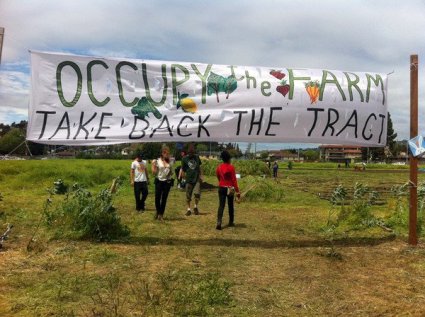open letter from occupy the farm

On Friday November 16, 2012, the University of California (UC) razed all of the publicly planted crops on the Gill Tract.
Occupy the Farm is disappointed that the UC has unneccessarily destroyed the hard work of the community and food that could have fed it. Over the course of the last month, members of the public sowed edible winter greens together with fava beans, a popular and effective cover crop. Had the UC left these in place, the Gill Tract would have benefited from the necessary nutrient building over the course of the winter, and would have produced food for the community. The weekly distribution and harvest events could have continued that, over the course of the summer and early fall, have yielded over one ton of food from the crops planted during the occupation last Spring. This free food was distributed locally in Albany, Berkeley, Richmond and Oakland at pop-up farm stands organized by Occupy the Farm.
However, the successes of the last seven months inspire us to continue to organize. Despite the UC police raid and the destruction of over half of the crops in May, we still managed to grow and distribute thousands of pounds of free food to the community this summer. The unprecedented public access to the Gill Tract this spring allowed thousands of Bay Area residents to finally set foot on the land and farm. In August, a successful petition for referendum was submitted against the Albany City Council approval of UC development. In September, Whole Foods cancelled its development plan with the UC entirely. The UC also announced a modest ten-year guarantee to preserve the northern piece of the land and promised a nebulous College of Natural Resources program for urban agriculture.
Now is the time to compare our position to that of the UC, and to make it clear what we are fighting for.
We want to see the Gill Tract preserved as farmland, in perpetuity.
Some of our members have been fighting to save the Gill Tract from UC development for decades. In 1997, the UC administration walked away from similar commitments - collaborative talks with a coalition of community groups called BACUA (Bay Area Coalition for Urban Agriculture), that spearheaded the establishment of a center for urban agriculture on the Gill Tract. At the same time, the UC released a Master Plan that revealed its intention to build baseball fields and structures on the prime farmland, stating, "The College of Natural Resources now plans to relocate its agricultural operations from the Gill Tract to an off-site location. The operations are being relocated because the existing facilities are substandard, have inadequate security, and because academic research is moving in new directions that require new types of facilities.” Dean Gilles' recent announcement of a ten-year commitment to
'metropolitan agriculture' on the tract is a step in the right direction, but it is not long term, toward the interest of future generations. If the UC wishes to demonstrate a commitment to urban agriculture at the Gill Tract, it should legally re-designate this land so that it is preserved as an agricultural commons, in perpetuity.
We are organizing to ensure that the public has access to the land and a say in how it is used; the UC has yet to host a single open meeting.
Since April, Occupy the Farm has held over 10 open forums about the Gill Tract. These have occurred on the UC Campus, in the Albany community, the UC Village, and other locations in the Bay Area. Hundreds of people have attended these events in an ongoing collaboration to develop a collective vision for the future use of the land. It is unfortunate that, despite several invitations, the UC administration continues to refuse to engage with the public at these forums, or to hold any public meeting of their own. An urban agriculture program at California's public University should not just make reference to, but must include local urban communities, to consolidate our collective experience and knowledge as urban farmers, and educate the public at large.
We believe ALL of the Gill Tract should be used for urban agriculture; the UC intends to use only a small portion of the land.
While our cultivation has focused on the northern portion of the Gill Tract - the last substantial parcel of undeveloped agricultural soil in the East Bay - the southern portion of the tract also has nutrient rich soil. These southern portions are in dire need of soil testing and bio-remediation. We believe that any truly comprehensive urban agriculture program at the Gill Tract must offer accessible programs to test and rehabilitate soil contaminated by industry and development. Unfortunately, 100% of this southern portion of the Gill Tract is still slated for immediate commercial development by the UC. On the northern portion of the Gill Tract, the UC administration has not revealed the exact percentage of land that will actually be used for its urban agriculture program. Presently, the vast majority of the northern portion of the land is allocated to corn-based genetic research to benefit the biotechnology industry. The corn is grown to be inedible and the the research
results in private patents, like the one that belongs to Sarah Hake, who recently patented a gene in corn that she discovered through research at Gill Tract. She applied this gene, Corngrass1, to the genetic modification of switch-grass to force to remain in its vegetative state, to never truly die, to be 'forever young'.
Both the northern and southern portions of the Gill Tract are invaluable resources for community-based urban agriculture. We are committed to using both portions for the benefit of the community or the production of urban agricultural knowledge.
To get involved or receive action updates:
- find us on facebook as the community group "Occupy the Farm"
- follow us on twitter @occupyfarm
- contact [email protected]
- text "gilltractfarm" to 41411 to receive notifications via cell phone

